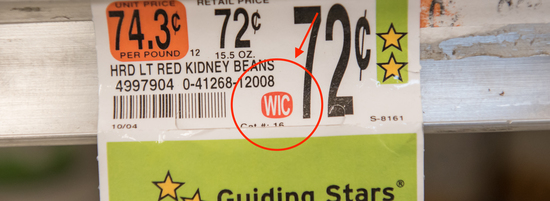With covid I've seen many calls to leave things for others:
- Don't buy WIC-eligible items, leave them for people who can only buy those specific items.
- Don't use grocery delivery services, leave the slots for people who can't go to stores.
- Don't buy masks, leave them for healthcare workers.
- Don't buy groceries at the beginning of the month, leave them for people using EBT, which renews on the first.
Let's set aside for the moment whether these are accurate, [1] does this kind of thing work? These are all cases where at the current price there are many more people who want the thing than people who can supply the thing. In normal times the price would rise until these balanced, but in emergencies our society has chosen not to allow that. Let's say you're considering buying store-brand kidney beans, a WIC-eligible item, the last one on the shelf. If you choose not to buy it, what happens?
One possibility is that it stays on the shelf until someone who can only buy the store brand of kidney beans comes along, and they're able to buy it. Another is that someone who doesn't know to look for the WIC symbol comes along, and they buy it instead.
There are about 7M people covered by WIC in the US, out of a population of 330M, so 1 in 50 shoppers is a decent estimate for what fraction care about the WIC status of items. This means that whether leaving it for someone else is likely to work depends enormously on whether you expect most of society to be going along with it. If it's just you and a few other scrupulous people, probably someone else who isn't on WIC buys the kidney beans, while if nearly everyone is doing this then it probably works.
The thing is, though, getting everyone on board with one of these, distributing the message widely so that everyone hears it, explaining the details of why it matters so people agree and go along with it, is really hard! And pretty much all the time, instead of putting out calls for individuals to leave things for others it makes more sense for sellers to apply restrictions. For example, UK supermarkets have been trying to restrict delivery to vulnerable people and US supermarkets have been designating hours for vulnerable people and essential workers.
Avoiding things in the hope that someone who especially needs them will be able to get them instead usually won't work, and isn't a very good altruistic tradeoff. If you do want to improve distribution in situations like this, encouraging sellers to prioritize is likely much more valuable. Alternatively, look for ways to shift demand to other things and work around the shortage.
[1] For example, in MA distribution of EBT is staggered
throughout the month, but "don't buy on 4/1" was still going around
in local groups here.
Comment via: facebook


I think in many cases it makes sense to use the prioritization you describe, but I have two concerns about it:
1) I think it's possible that with collective action problems, it's really easy to miscalculate the potential effects of your choice (and talking about your choice) has on the behavior of others, and therefore harder to estimate the true good the individual action produces (and the harm that explicitly discouraging mildly good but ineffective actions might cause).
2) I think it's likely that "how much of a sacrifice" something is varies a lot, and could depend how many other people are doing the thing and how your community views the thing. So it might be worthwhile to have a community that encourages doing inconvenient things, because that makes it easier to do good things that are inconvenient (ultimately making them less inconvenient).
Finally, I'm also not sure I agree that all things can be directly converted into "time spent" and then directly compared. Yes, if I have a specific amount of time I spend on social media, where I can either advocate for policy change or individual action, I should use that time for policy change. But some kinds of time use are inelastic or not-exchangable at a certain point, and one-off uses of mental time for deciding how to spend that inelastic time in a positive way doesn't seem wasteful to me. So I think it's better to be more nuanced than just saying "everything takes time and so everything is a trade-off" and instead evaluate which things genuinely trade off time with each other.